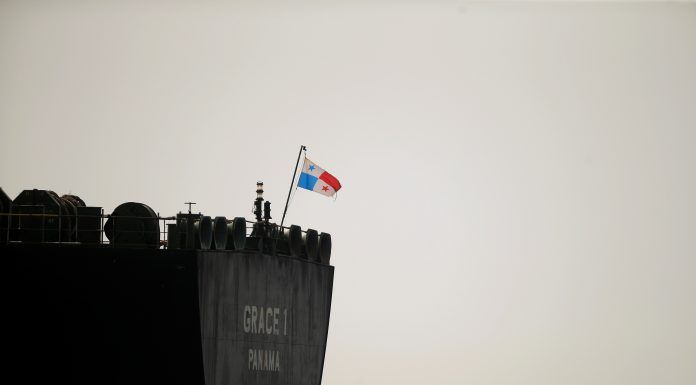By Kate Holton
LONDON, Aug 16 (Reuters) – An Iranian tanker caught in the standoff between Tehran and the West could sail free from British territory Gibraltar on Friday, unless a last-ditch push by the United States succeeds in dragging the saga back into court.
The Grace 1 was seized by British Royal Marine commandos in darkness at the western mouth of the Mediterranean on July 4 on suspicion of violating European Union sanctions by taking oil to Syria, a close ally of Iran.
Gibraltar lifted the detention order on Thursday after it said Tehran had given written assurances that the ship would not discharge its oil in Syria. But the United States is still seeking to detain the vessel on grounds it believes it was helping Iran’s Islamic Revolutionary Guard Corps.
“She is able to leave as soon as she organises the logistics necessary in order to sail a ship of that size,” Gibraltar’s First Minister Fabian Picardo told BBC Radio.
“Could be today, could be tomorrow.”
Asked about Washington’s position, he said that would be subject to the jurisdiction of Gibraltar’s Supreme Court.
“It could go back to the court absolutely.”
The last-minute U.S. intervention was the latest twist in a saga that started in the early hours of July 4, when British Royal Marines abseiled onto the Grace 1 to impound the ship.
That kicked off a sequence of events that saw Tehran seize a British-flagged oil tanker in the Persian Gulf two weeks later, heightening tension on a vital international oil shipping route.
That tanker, the Stena Impero, is still detained.
Gibraltar said it had found evidence confirming the Grace 1 was carrying its cargo – 2.1 million barrels of oil – to the Baniyas refinery in Syria. Tehran denies that.
[aesop_image img=”https://kayhanlife.com/wp-content/uploads/2019/07/2019-07-04T095910Z_1_LWD00166UYZ47_RTRWNEV_E_4143-MIDEAST-IRAN-TANKER.jpg” panorama=”off” credit=”STILL PHOTOGRAPH OF SUPERTANKER GRACE 1 DETAINED IN GIBRALTAR ON SUSPICION OF CARRYING CRUDE OIL TO SYRIA. REUTERS./” align=”center” lightbox=”on” captionsrc=”custom” captionposition=”left” revealfx=”off” overlay_revealfx=”off”]
U.S. ALLEGES TERRORISM LINK
Seeking to “de-escalate” the matter, the first minister of the British territory met with Iranian officials in London. He later agreed to release the ship after saying he received assurances that the cargo would not go to Syria.
But as lawyers gathered at Gibraltar’s Supreme Court to hear confirmation of the release on Thursday, news came of a U.S. attempt to detain it on separate grounds, that it had links to terrorism.
Washington designates Iran’s Revolutionary Guards as a terrorist organization. Britain’s Foreign Office and the office of Gibraltar’s first minister declined to comment on Friday on the precise status of the U.S. request.
U.S. Secretary of State Mike Pompeo warned all mariners that if they crewed a ship affiliated to the Revolutionary Guard, they would jeopardise their ability to enter the United States. “#NotWorthIt,” he tweeted.
Panama said last month it had delisted Grace 1 from its registry after receiving “an alert” that it had participated in or was linked to terrorism financing.
The two tankers have become pawns in a bigger game, feeding into wider hostilities since the United States last year pulled out of an international agreement curbing Iran’s nuclear programme and reimposed economic sanctions.
Calling the U.S. attempt to block the tanker “piracy” and denying any commitments had been made to secure its release, Iranian officials said Grace 1 would sail shortly after the 25-member crew made preparations including refuelling.
“Based on the owner’s request, the oil tanker Grace 1 will depart for the Mediterranean after being reflagged under the Iranian flag and renamed Adrian Darya after preparing for the journey,” state television quoted Jalil Eslami, deputy head of Iran’s Ports and Maritime Organisation, as saying.
(Additional reporting by Dubai newsroom and James Davey in London; Editing by Kim Coghill and Andrew Cawthorne)


